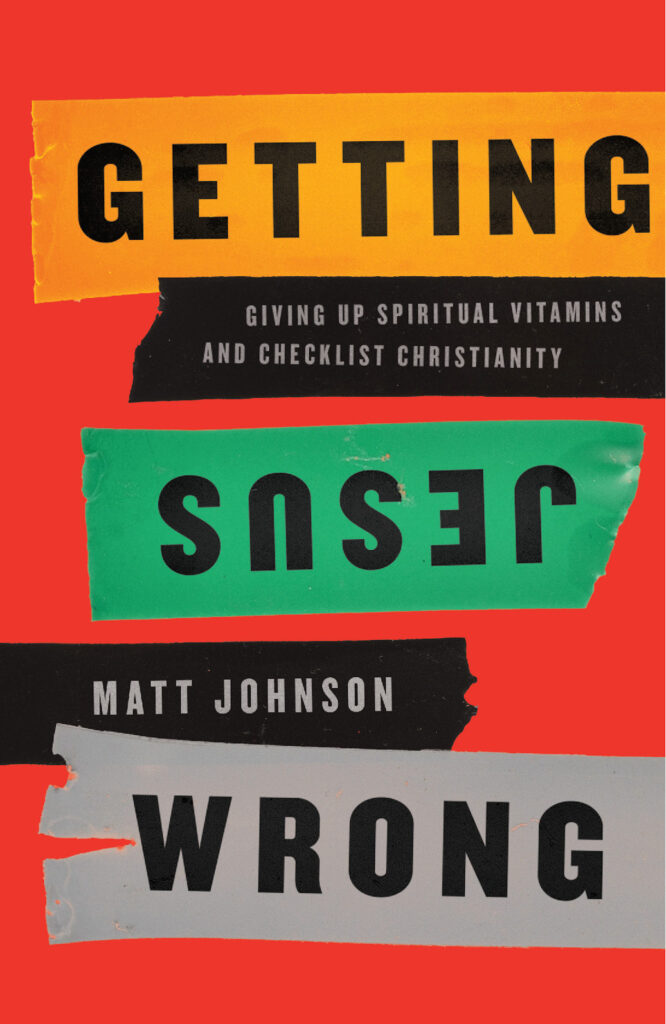I realize now that during my twenty-five-plus years as a follower of Jesus, I’ve had many ideas about him. I’ve chased movements and given my best shot at checking off discipleship lists. I’ve tried to be good, and I’ve been where the exciting Christian movements are happening. The problem all along was that as part of these ideas, I’ve always thought of Jesus as a sort of lucky rabbit’s foot. I wanted him to give me answers from the owner’s manual for life.
When I consider the last decade and a half, I’ve thought of Jesus as a life coach, as the deity who handed me a moral checklist, as a movement leader who was inviting me to become great by my association with him. He was a visionary leader with a brilliant plan to homogenize culture. Between you and me, I was using God for his gifts rather than loving him as The Giver. I was using god stuff (formulas for creating movements, personal discipleship programs, becoming an insider of an influential church) to ensure positive outcomes for my life. And all of that is a pagan enterprise.
Perhaps you’ve done similar things. Maybe you haven’t had the same sorts of experiences I’ve had. You haven’t been part of a “movement.” You’ve never church hopped to chase the next exciting trend. But there is a pervasive, underlying message in many churches regardless of their theological flavor. And that message is basically, you get what you give, good things happen to good people, and bad things happen to bad people. Often churches have prescribed forms of “How to Live the Good Christian Life.” It could be a discipleship program or a devotional practice. It may even be taking up the cause of the poor or marginalized. These are all great things, to be sure. But don’t we often leverage these things in our hearts to ensure that we’ve got enough in our personal virtue account? Are these things meant to buy us that get-out-of-jail-free card?
When the Trouble Comes
The truth is that trouble still invades our lives. And when trouble comes, of course we feel let down and depressed, but somehow our belief that being a Christian meant a life without trouble makes our burdens even heavier. Now we have guilt (why can’t I face this trouble with a laid-back faith?), shame (perhaps this trouble is my fault; if only I had been a better Christian), and of course anger (at ourselves, God, the churches we attended, and the leaders we followed). As for me, I’m done pretending life shouldn’t hurt. Hope and healing come when we get to a place where we can truthfully admit what our real struggles are.
Often the brand of religion we’ve associated with has told us to follow our hearts and that our faith would feel like every day was a day at the spa. When real life catches up, we’re left scratching our heads. This is not what we signed up for. May I ask you a question? What’s more common among human beings: success and mountaintop experiences? Or struggle, hardship, and pain?
Last I checked, mortality rates are holding steady at 100 percent and entropy is still a scientific fact. I know that sounds more like something Eeyore would say than motivational guru Tony Robbins, but we are better off coming to terms with the facts of entropy. For years my idea of being religious was taking my spiritual vitamins so life would be better. What were those vitamins? Pray harder. Devote yourself more wholeheartedly. Give to the ministry! Volunteer! But this is self-help, not salvation.
Finding Hope in a Messed Up World
While we still live in a messed-up world, hope is not something we can activate through spiritual activity or church associations. No, the core of the Christian faith is about objective hope that lives outside of our personal experiences and hearts. Objective hope is found in the miracle of the death and resurrection of Jesus.
The self-help brand of Christianity has a fatal flaw: hope for life is supposed to be found in what believers actualize for themselves. We hear these catchphrases all the time: “Find the hope within,” “Reach for the stars,” “Never give up on your dreams,” and the list goes on. The problem is that slapping these slogans onto Christianity doesn’t work. Because the core of Christianity is the story of a Savior that . . . well . . . saves! The gospel is not a coach giving spiritual advice.
Unfortunately, the human heart has a default mode that mucks up our spirituality. As John Calvin (Institutes of the Christian Religion) has said, “The human mind is, so to speak, a perpetual forge of idols.” In the words of Brennan Manning, “It is always true to some extent that we make our images of God. It is even truer that our image of God makes us.” So often we project our hopes and dreams onto the divine will and then remake and rename our Savior. I’m guilty as charged.
Recognizing False Saviors
There are different kinds of these false saviors: Jesus as Life Coach, Jesus as the Giver of the Moral Checklist, Jesus the Movement Leader, or the Visionary. Maybe these Jesuses have been my false saviors, but yours have been others. Maybe we can find some common ground.
I became a follower of Jesus at the age of sixteen, and my first church home was a little Pentecostal church. In this church, I was supposed to be a good boy; I wasn’t. In my twenties, I attended a Calvary Chapel that said the same stuff, so I hid. I still wasn’t good. Until a few years ago, I was part of a “cutting edge” church that, during a near twenty-year period, helped forge an influential brand within neo-reformed evangelicalism and was on the forefront of a church-planting movement. But then it flamed out just shy of the twenty-year mark, due in large part to the corrosive effects of the megalomania of its leadership and congregation. I could blame the higher-ups in leadership, but it was people like me that gave them a platform in the first place.
Giving Up the Chase
Each church experience shares a common thread: I was chasing after a movement of the spirit in an effort to normalize and capture a significant moment—a moment of excitement over church growth or cultural influence. Maybe there’s a better way of putting it: I was chasing after an image I’d projected onto God. Turns out, that image was stick and carrot. And the stick and carrot inevitability lead to the cliff’s edge of pride and despair.
Since I’ve come to terms with the stick and carrot of this false image of God, I’ve discovered the way out of the vicious cycle: death and resurrection. By death I mean both the little “d” deaths we experience throughout life and the inevitable big “D” death. This may all sound a little too cranky and dark. For the record, I do believe that belonging to Jesus makes a positive day-to-day difference in the lives of believers. But we simply can’t expect life to be a string of mountaintop experiences. Expecting these types of experiences is corrosive to our souls because much of life is lived in a valley.
The bored, fickle human heart is always on the prowl to latch onto what’s new and exciting. These same impulses are common among Christians. We want some kind of tactile proof that the Christian faith “works” and can deliver personal transformation so we can boast of our spiritual feats, apart from Christ. Well, we’re in good company. Even Jesus’s disciples—the twelve men who had spent three years with him—continually missed the point of who he was and what he was up to. They wanted a king to overthrow the Romans and restore their people to cultural, political, and religious significance. They thought they needed a powerful military leader unafraid of storming the castle. Instead, they got a Savior who died on a cross.
Excerpted adapted from Getting Jesus Wrong: Giving Up Spiritual Vitamins and Checklist Christianity ©2017 by Matt Johnson. May not be reproduced without prior written permission.
GETTING JESUS WRONG: GIVING UP SPIRITUAL VITAMINS AND CHECKLIST CHRISTIANITY
The truth is, we all want something from Jesus. Some are just hoping for a little help to get through life—a new direction, a purpose that will get us up in the morning, an exercise plan, a way to get organized. But that approach to Jesus doesn’t result in real faith or love.






